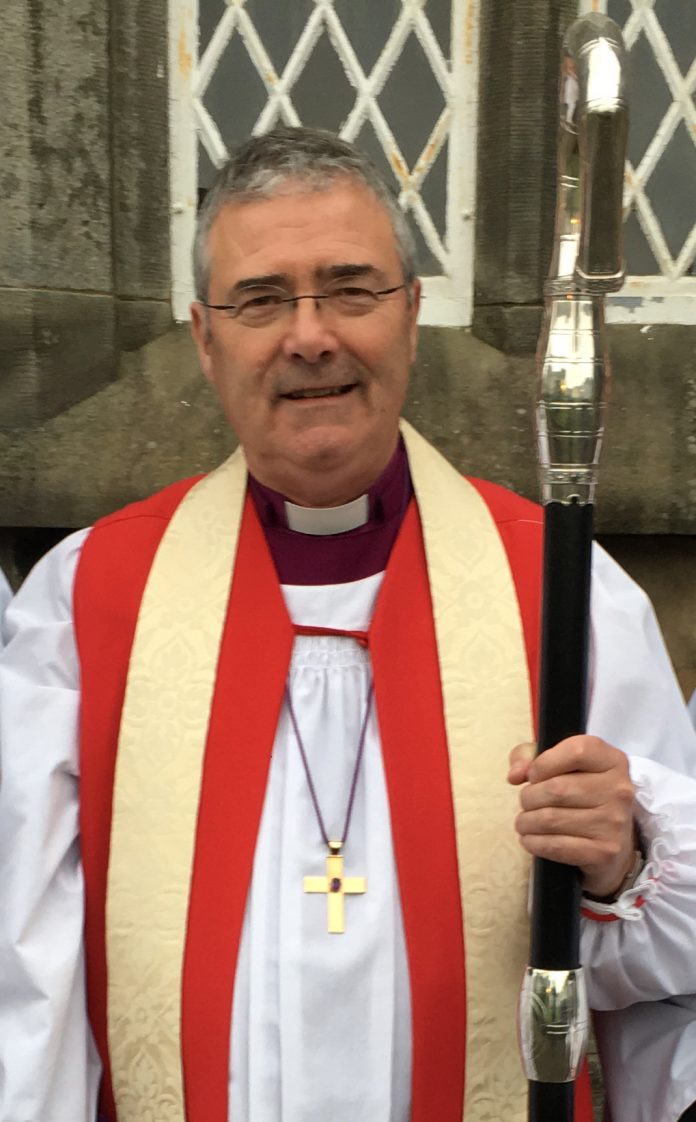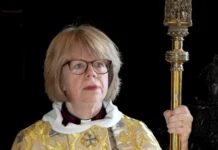1 December 2020
When I was translated to Armagh on 28th April, I had not anticipated that we would be able to meet as a General Synod in 2020. I don’t suppose many of us did. And it was for that reason at that time, I wrote and published a number of pieces, including one which was, to all intents and purposes, a Presidential Address to the General Synod that wasn’t going to meet. But here we are meeting as a General Synod, true to the pattern we have learned to live with in these Covid days, that it’s best to have (at least) plans B and C up your sleeve.
Of course, it’s immensely frustrating for all of us to have to meet this way. The only consolation for me is that I’ve some chance of getting into the history books as the Archbishop of Armagh who had the longest gap between his election and his enthronement. I think I’ve achieved that already, although the Bishop of Cork or of Cashel will soon let me know if I need to hold out for a little longer to beat some 14th century friar who couldn’t make it to Armagh because of the turmoil caused by the Hundred Years War or until he had a dispensation for some strange impediment.
This will be a foreshortened Synod. Two Bills and the Reports of the Representative Body and the Standing Committee. I’m banking on the hope that you won’t want me to dilate on the technicalities of the Charities Legislation, which prize has been given to some other soul. And I love our National Cathedral as much as any Irish Anglican, but, with the best will in the world, I’m not proposing to say anything much about the financial arrangements necessary to repair the roof. The two reports have very able Proposers and Seconders to lead you through them.
So, is there anything I can say about what has been happening in the Church and in the world, or particularly in Ireland, since 28th April which is worth saying or worth hearing?
First the continuities. I continue to think that all that has happened since 28th April underlines the need for gratitude, an emphasis on reconciliation and of deepening the pastoral nature of our mission.
Reconciliation
Turning to reconciliation. There are a number of forces at work within Ireland, between both parts of Ireland and between this island and Great Britain which have the potential to be more than a little disruptive of many decades of stable relationships. It’s easy to exaggerate them but also easy to ignore them. One thing we can be sure of – the task of rebuilding trust, the wisdom of knowing when to speak and when to keep one’s counsel, and the resilience of determined peace–makers will be needed more than ever.
And of course, there is reconciliation at a more basic level in Northern Ireland. We have tried many things in Northern Ireland. A lengthy peace process. An attempt to strengthen a very unbalanced economy. A wider and deeper tolerance of one another. Some attempts at shared schooling. But very very few of shared living or social integration. Reconciliation is still fresh in its wrapping paper. And setting Covid–19 aside for a few moments (because one way or another it will be laid aside) the question that we as individuals and as a Church, need to ask ourselves, is, do we really want to say to our children and grandchildren “I’m sorry, but this is the best I could do for you?” A society north of the border which is still divided in virtually every department of life and with much sectarian feeling still at its core.
There may be very little we can do as individuals and as a Church about these broad and deep seated problems in society; but there will always be something. Many many little somethings. It’s no harm to remind ourselves that this is an Advent Synod. I don’t want to turn this into a sermon, but Advent is the time of the year, when we talk of His coming again in “power and great glory to judge the living and the dead”. What the Scriptures call The Day of the Lord. A day which will be His, like no other has yet been. A day when each of us will stand before those searching eyes, to give an account of all we have done in the flesh. Every concealed act of condescension or cynicism; every hidden act of generosity. Every casual, clever, wounding phrase designed to sow division and enmity; every humiliation borne, though with tears, for the sake of peace. Every bitter word, that poisoned another well of forgiveness and reconciliation. Every hesitant gesture of goodwill which filled us with worry, in case it was misunderstood and thrown back in our faces. Although we may not recognise them at all, and have forgotten them altogether, we will have to acknowledge that they are our own. That they are what we contributed to the health of our society, but not always in the fear of the Lord much less in the love of Christ.
And within our Church, this Church of Ireland that we love, there is at least as much need for healing and reconciliation and even basic understanding, as there is in the world beyond our walls. Our shortcomings take many forms. An ignorance of how we live, north and south. A deeply unattractive sense of superiority from some; a repellent self–righteousness under the guise of piety in others. Both attitudes are cold and barren because there is no love in them. None. We are reconciled in one body by the Cross, but we are reluctant to share his peace. Can I suggest that it is time that we think twice before we limit God to our own experience of Him, and recognise that He has as many ways of dealing with us as a Father has with his varied children. Jesus Christ was the first man to conceive of mankind as a unity. It is a unity always in danger tearing itself apart in His world, but it is unity which is meant to mature in the household of faith. The unity of a family which gets its life and vigour from what is different about each member, at least as much as it does from what they have in common.
I have had to learn that lesson a little painfully and with some humiliation myself this year. You will all remember the killing of George Floyd by a Minneapolis policeman and the flood of comment and condemnation which followed. I had thought of saying something at that time but hesitated and didn’t. That hesitation wounded a number of people in the Church of Ireland who had expected some words of solidarity from a senior figure within the Church. After they had written to me about that disappointment they were good enough to set up a meeting with a number of Black, Asian and minority ethnic clergy and readers to give me an opportunity to listen to them and get to know them better.
It wasn’t a revolutionary meeting, and in many ways it was a very heart–warming encounter. But it was also a sobering. I want to be careful not to overstate this. But here was a group of people who love the Church of Ireland, who are dedicated to the faith communities where they live and serve. They bring skills, insights and perspectives which we have not drawn upon. As I say, I don’t want to overstate this, but look at the colour of the faces on your screen. We still have a lot to learn, myself included, about what we mean when we say “I believe in the Catholic Church”.
Pastoral mission
There are many positives too. For instance, the pastoral way in which as Anglicans we cast our mission in the world has been quietly unveiled over the past months, a little Apocalypse all of its own. We have been learning and putting into effect the truth which God set as the foundation of the whole world; that all are responsible for all. As the Bishop of Meath said in her excellent sermon a little earlier, we thought we could manage the world, but now we know we can’t. That one of life’s smallest components, a microbe, can have the better of the best part of the world and the best that is in us.
And that the only way to resist its atomising power is by being knit together. By the strong caring for the weak, by learning that most counterintuitive truth, that we are only as weak as our strongest person who doesn’t see his or her dependence on the weak.
And to be honest with you, I’ve been proud of the Church of Ireland during these past months. Proud of how we’ve adapted our ministry in the face of uncertainty. Proud of the way we have gone to great lengths to make our places of worship as safe as following all the advice we were given could make them. Proud of the Christian citizenship which the Archbishop of Dublin and I spoke about in our joint Harvest Statement. Proud too of our patience and civic awareness when we have been prevented from worshipping in church, such as at this moment, in both parts of this island.
Not being able to meet together for worship and mutual encouragement and fellowship is not a small thing. As a Christian Church we are greatly reduced by not meeting together. It isn’t everything as we’ve proven, but it is a pretty big “something”, which we believe has many benefits, psychological and spiritual. But even when we’ve not been able meet in church for worship we have in so many places reached out into our communities and worked with all people of goodwill to be companions for the lonely and a support to those who were afraid. And there were many who were and still are afraid.
We tried to bring a variety of worship to people who would seldom have come to worship and I hope by doing so we have lowered the step into church a little for those who might wish to encounter us in the flesh and perhaps in our resumed worship, also encounter the holiness of God. Speaking personally, during the early days of the first lockdown when even some of the mainstream commentary was verging on the apocalyptic I found that the service of Compline, with its emphasis on God’s protection through the dark hours of the night, really came into its own.
Today is also a day when we celebrate the thirtieth anniversary of passing the legislation which allowed women to be ordained as priests and bishops. I won’t say much about that now as we will soon be asking Synod to agree to a suspension of Standing Orders so that we can enjoy a video made by women serving in those orders in the Church of Ireland and reflect on how that ministry has enriched our witness and perhaps how we might let it better shape our mission. The number of women in active ministry, in formation or attending Selection Conferences is not as high as might have been expected 30 years on. Perhaps the working group headed by the Bishop of Meath will soon help us shed some light on why that is the case. May God prosper the work.
Sometimes people ask me what I think life, or even just church, will be like post–Covid. I usually say something along the lines of: ‘It’s too soon to say.’
But it will depend on what we have been doing and preparing for during Covid.
And in relation to the latter point, I think we were wise to hunker down for a while. It wasn’t possible to know if the storm would pass. However after a while, and although we weren’t always treated as responsible adults in terms of the data that was shared, it became clear that this was going to be a long haul. The likelihood of vaccines being made available rather sooner than predicted may bring the light at the end of the tunnel a little nearer. Yet I think we should be preparing by prayer and study to bring such evangelising as we will exercise, in that pastoral form I talked about earlier. We will need to prepare ourselves to have the word and the disposition to bind up the wounds of the psychological damage that living as we’ve had to do has caused. To be open in a way we have perhaps never dreamed of before, to care for those who the Good Shepherd carries to us on his shoulders; sheep not identified as of this fold, but His sheep nevertheless.
It may be that the mental health initiative being funded by the All Churches Trust will help us do some good in a situation which couldn’t have been envisaged when the bid was made.
I know there are those who have said that people will lose the habit of coming to church and they won’t come back. I thought that way myself, and to some extent still do. But if that is all it was – “a habit” then of course it won’t have survived the testing time we have been through. Crises such as this one, are just that in spiritual terms too. A sort of sifting process in our lives which call us back to our first allegiances and priorities.
On a much broader canvas governments will face enormous policy decisions. Where will the priorities be? On which policy areas will the best brains and the greatest resources be concentrated? Well, there are two groups (cohorts I suppose they would be called nowadays) who have suffered more than most and lost more than most in this supposedly indiscriminate pandemic.
The very old and the fairly young
As a society our treatment of older people has been not far short of a disgrace. It is too easy to blame governments, but by and large governments have no policy preferences or big ideas any longer. They ask the focus groups what we want and then they give it to us. In a democracy every person is a politician to some degree and we have a great deal of responsibility for the shape which our society has taken and where it’s priorities lie. It will be interesting to learn just how much effort was put into finding ways for close relatives to visit very confused, frightened and in many cases dying residents, who had to make do with “she can’t visit, it’s for your own safety”. Safety is important but it’s not everything in such circumstances. People nearing the end of their lives, some of them barely able to understand why they were being abandoned (or so it may have appeared to them) by their loved ones. We rightly accept slightly increased risks to keep schools open so that children will not lose out on their education. Perhaps, on balance, there is a case for the benefit of allowing the physical presence of someone who the person loves, and who could provide a unique sense of reassurance to them, as against any threat to safety. We can only hope that someone actually asked the question.
And if we don’t come out of this pandemic more determined than ever to devote our best brains and substantial resources to a properly integrated health and care system then I wonder when we ever will.
And the fairly young. Already saddled with a mountain of public debt as a legacy of the financial crisis of 2008 it has now grown to wartime proportions inside a mere eight months. And in a heartless symmetry we pile them high with personal debt as well.
Money is cheap now, but debt still has to be paid down, and it is the generation now at school and at university or in the early years of their working lives who will have to pay it down either directly or by what they have to forgo. I have no idea what the public policy options are to help address that very demoralising problem. But I can’t help thinking that in terms of tax structures and investment some of us will need to be prepared to have less so that another generation can have something of the material comfort we enjoy. And similarly any recovery that will be worthy of its name, and which this generation will buy into, will need to be a green recovery, otherwise the effort needed to make it work simply won’t be there.
We know now who can be counted among our essential workers. The nursing assistant who, despite his or her own fears, went to work every day during the worst of these months. The staff in care homes who with courage and endless resourcefulness did everything they could with not much outside help to make them places of safety. Lorry drivers and delivery drivers and warehouse workers on the minimum wage. Very often on this island, migrant labourers in food factories, who kept working simply because they had to in order to feed their families. The people who kept us alive and kept us fed in the safety of our homes. And since they’ve reopened, all those who work in schools, who by their prodigious and patient efforts (and probably by a miracle of grace) have not only kept our schools open but have continued to teach and to learn.
There is one group of people who I haven’t mentioned yet–and probably everyone in this Synod will know one or more of them – people who were either gravely ill with Covid–19 or who had family members die in almost unimaginable circumstances, unable to be with the people who had loved them longest and deepest. I know many parishes will have had their own ways of helping those in that sort of need. Though heaven knows it was almost impossible, except through prayer, to know what to do. As I said earlier, I do not want to make this into a sermon, but this is an unusual Synod and please God I will have others to speak at in the future when I can be a bit more businesslike. To those people who have suffered so much, I can only point to the One who has gone deeper into innocent suffering than anyone ever has. And who died gasping for breath, while those who loved him had to stand “afar off”. And who was their companion in death.
Gratitude
Given what I have just said, it may seem a little incongruous that I want to end on the note I began with on the day of my translation. Gratitude. When I was ordained deacon, and the old Defined Benefit Clergy Pension Fund was still in full swing, I had intended to retire as a rector when I reached the age of 65 in January 2021. I ask myself “what went wrong”?
Joking aside, I am deeply grateful to you for receiving my ministry as Archbishop of Armagh and for the hundreds of letters, and cards and messages of support I have received. I am grateful to God for calling me to this office in that little corner of his Kingdom, which we know as the Church of Ireland, and for its nurturing and forming me in the Catholic Faith. Being an Irish Anglican is only one way of being a disciple of Jesus Christ. I don’t even know if it’s the best way. But it is our way, and we need to understand it in its fullness and to cherish it. I don’t know any more than you do what other challenges the future will bring, but I pray that we can travel together along those little paths of love and suffering which mark us as individuals and as a community of faith in the eyes of the Father, as we find our way out of this fog, and faithfully into the vocation which his Providence has laid out for us.
Thanks be to God.



